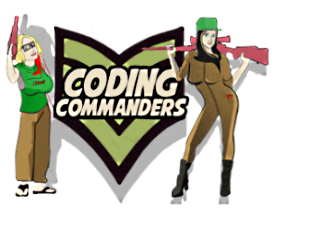I always loved playing adventure games on the computer as a kid. I’m talking
about old-school Sierra games like King’s Quest and Space Quest. They felt like
stories brought to life where you also got to solve fun puzzles, so when I had the opportunity
to start *creating* these interactive experiences in high school, I jumped at the chance!
My coding specialty is variety! :-P My favorite part of coding is learning new
languages and technologies, so I never stick with the same one for long. I’ve done Java,
C++, Python, Perl, Ruby, JavaScript… this year I’d like to try out Elm because I’ve
heard such good things. For example, it’s supposed to have really user-friendly error
messages.
I’ve also worked in various fields within tech: bioinformatics, education,
gaming, smart devices, healthcare, and user research.
With my current company
Compassionate Coding, my specialty is helping
technical teams work together more effectively.
I think the big one is that some techies are a little too attached to their
pattern-matching algorithms, which show up as stereotyping and bias when applied to humans.
So, for example, when I walk into a tech conference, especially if I happen to be wearing a
dress, many men there assume I must be a recruiter or in marketing or sales. All of those roles
are highly respectable and important to a business, but it’d be nice if men didn’t make the
assumption that I’m not an engineer just because their pattern-matching algorithm hasn’t been
exposed to that many women engineers. As it is, I feel like I have to prove myself over and
over to get past the bias.
It’s also been tough to be a strong leader without being perceived negatively. I’ve always been
naturally pretty assertive, which I think has helped me succeed in tech, but assertive women tend
to be viewed as
“abrasive”,
a term I’ve gotten in feedback multiple times. One male manager actually talked in a high pitch
to mock my voice when I was strongly disagreeing with him. That really hurt.
The microaggressions women face in tech can also be pretty tiring. They’re these little
indications that you don’t belong that may seem minor but add up over time. For example how
many times do I have to hear we need to hire an “iOS guy” or a “Rails guy” instead of hearing
more inclusive language like “iOS developer” or “Rails engineer”?
On a happier note, I like to think that all these challenges have made me a stronger person,
and they’ve motivated me to work to improve the industry for women and other underrepresented
groups.
One big step is understanding unconscious bias. It’s related to the pattern-matching
issue I mentioned earlier. The truth is that we are all biased. We all use stereotypes as
shortcuts to make judgments about people. Unconscious bias training helps us recognize and
question these assumptions we’re making. That way, we can achieve greater fairness in hiring
and promoting people.
Also, one everyday phenomenon to look out for is whether women or people from underrepresented
groups are being interrupted more often. Teams can make an effort to make sure everyone’s voice
is heard. This also helps support the introverts on the team.
And more generally, teams can practice cultivating empathy, which really makes for a more
welcoming environment for everyone. Even just slowing down for a few minutes to consider what
someone else’s life might be like and what challenges they may have faced that you haven’t
can help here.
ad">What project are you the most proud of? Why?
A few years back I built an app that used machine learning to predict autism in children
so that parents could get access to early intervention programs.
I felt grateful to be able to make a positive impact on families, and I also felt proud of
growing and leading the engineering team. Since I essentially acted as the CTO of the company
(though as is often the case for women, I didn’t get the actual title),
I gained really valuable experience in all aspects of running a tech startup.
I also grew really close to some of the people on my team, and even though we’ve now gone
our separate ways, I’ll always be proud of what we accomplished together.
It can really help to have a clear vision of why you want to enter the field—that is,
a clear purpose that’s especially meaningful to you. For a while in my career, I was kind of
hopping around startups without a clear idea of what I wanted to do. It was OK, and I learned
a lot, but I didn’t feel very fulfilled. Now that I have a strong purpose behind my work,
it’s easier to stay motivated and avoid burning out. The first step is really to get in
touch with your core values and allow those to drive your choices.
Also, please don’t beat yourself up! Coding can be frustrating sometimes, but we all learn at
our own pace and in our own style, so please be kind to yourself during the process.
I love this question!! An easy and fun one to bring to parties is this spicy,
creamy vegan bean dip:
- 2 cans of refried beans (the Rosarita vegetarian ones are vegan!)
- ½ cup of vegan cream cheese (Tofutti and Follow Your Heart are two brands to look for)
- 1 tsp liquid smoke
- ½ cup caramelized onions
- any hot sauce and spices you like (I use Tapatío, cumin, and garlic)
You just mix it all up and heat it all up, and it’s ready to serve with your favorite
dippers! For extra fun, you can serve it in a bread bowl (sourdough bread is almost always vegan)
and sprinkle vegan parmesan on top.
My omnivore friends love this one!

Follow April Wensel:
April's Facebook
compassionatecoding.com
Follow Coding Commanders:
YouTube
Facebook
Instagram



